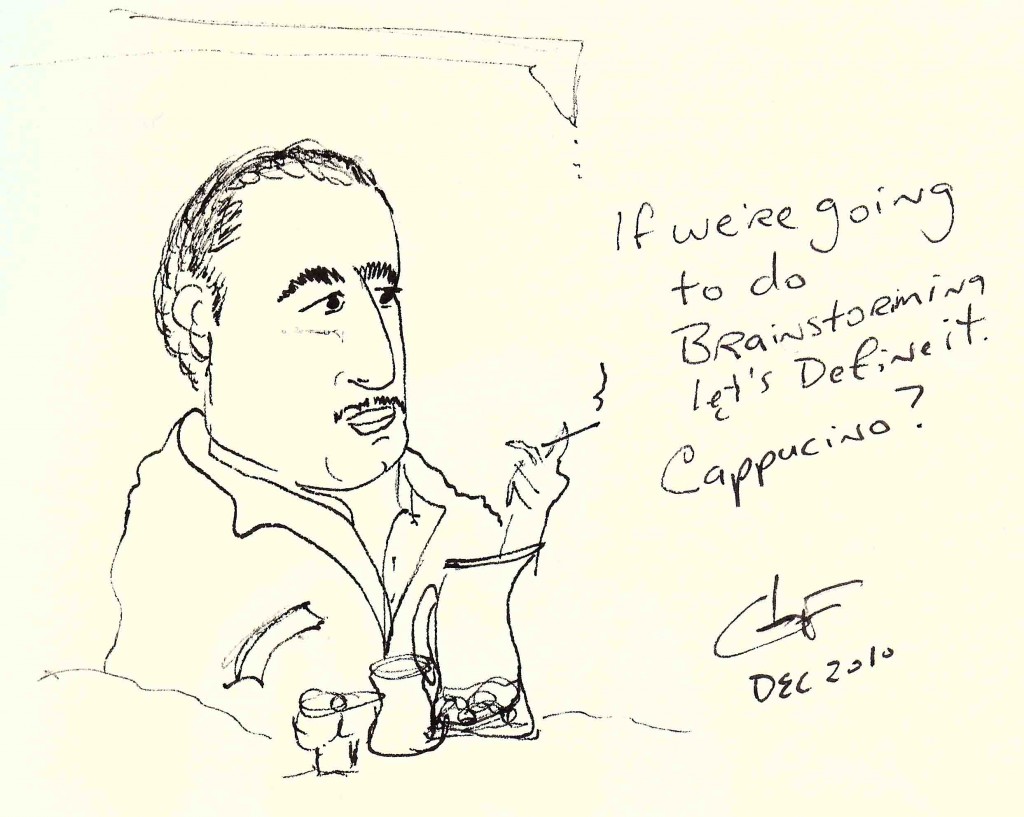 Brainstorming. What does the word mean to you? How would you define it?
Brainstorming. What does the word mean to you? How would you define it?
- Charting on an easel?
- Post-It notes? Or White Board doodles?
- A vigorous debate or discussion?
- Wall murals with Mind-Maps and other Graphic Facilitation tools?
- Virtual ideation using an online system?
- A wander in the woods thinking? Other types of “excursions?”
- A group of people exchanging ideas?
- An intensive one or two day session of idea generation
- Improvisation games or other kinesthetic exercises to stimulate ideas?
- How the originator defined it, that is, Alex Osborn in “Your Creative Power” and “Applied Imagination”
- A generic term for idea generation that includes 1-10 and more…
Those of you who read this blog often, know I got caught in something of a flame war last summer with regard to the claim that Brainstorming Doesn’t Work.
Because I define Brainstorming, currently, as #10, I would claim it does work. This definition includes participant training, coaching on when to defer judgment, a neutral facilitator, and the use of various tools and techniques. Most of the academic research on the effectiveness of Brainstorming does not include these requirements. As a result, even Wikipedia says that it is not as effective as other techniques for group idea generation.
If you define it as any other item in my list than #10 or #11 — the claim that it doesn’t work is fair.
More people than not are going to define it with one or more of #1 through #9. The Cambridge dictionary definition — #7 — is simply a “group of people exchanging ideas”. This is a really bad definition because it leaves out brainstorming alone, and it does not include any training or structure. Brainstorming needs to be thought of as more than a group technique, and even Osborn didn’t think of it this way. Brainwriting is another technique that ought to be included under the rubric of Brainstorming, and yet typically is not.
It would be easy to say, alright, let’s call “formal brainstorming” (#10) — the kind that has been proven to actually work — something else, like “Ideation” or “Idea Generation” or “an Idea Workshop”. I’m not a fan of these terms, although I am forced to use them. Ideation sounds pretentious, and, it’s polarizing. Some like the word, some absolutely hate it. About once a week somebody Tweets how much they hate “Ideation”. Hate is not conducive to good ideation! Idea Generation is a good descriptive term, but it sounds mechanical to me, and, it has little pizzazz. Idea Workshop, well, it’s alright, but it implies in-person, and not all ideation is done in a workshop setting.
I still like the word Brainstorming. It connotes a bit of excitement. I utterly refuse to stop using the word because some say it’s not politically correct. Have you heard? It’s offensive to those who have epilepsy and other brain disorders. While I sympathize with those afflicted, we are simply not talking about you. It’s called a metaphor. Thoughtshowers? I think not.
I totally agree with the various pundits, scholars, and consultants who are calling for a better way to generate ideas. Sperry’s old right brain/left brain model is somewhat outdated, new brain research tell us that ideas are a result of new connections made in the brain. The kind of “brainstorming” that gets done in meetings around the world, day in and day out, is usually #1, #2, or #3 in my list above. I would suggest that while not completely ineffective as a way to generate ideas, it is best to think of these fundamental techniques as “a start.” The brain gets activated when we ask it a question, so, these starter techniques are where a journey in idea generation begins. And, not where it should end! To get to a good idea, we need to incubate and give the brain time to form a new pattern and create a new connection. Various tools and techniques can, and should, be used. The likelihood that this will happen instantly in the context of a board room is low. What people say doesn’t work is not complete Brainstorming, call it StartStorming. Or BrainStarting. Or BoardRoomStorming.
I’m tempted to be a smart alec and say, well, all those things listed above are just… thinking. While that’s true, it’s a particular kind of thinking, a quest for “new” thinking in order to solve a problem. So we still need a word for it.
So how about this. Let’s go back to calling it Brainstorming. But let’s re-define brainstorming as any technique ( including all those listed above, and others) that can be brought into play — by a group or an individual — to come up with a great idea. With this definition, if your Brainstorming doesn’t work, it’s not because the method doesn’t work, it’s because you didn’t use enough tools and techniques to get it to work.
Let the flame wars begin!



7 responses to “Re-define Brainstorming, Don't Damn It”
While your definition of brainstorming as something that works to generate ideas is a bit too “creative” (cheating), I agree with your support of classic Osborn Rules brainstorming.
My MBA students who have been told they have been involved in brainstorming are astounded at the fluency and effectiveness when they use the Osborn rules. They become big fans of doing it right.
With the strategic, cross-functional, wicked problems I help teams attack, brainstorming is critical, but in a different way.
Brainstorming is excellent at creating long lists of short ideas, like advertising slogans (Just do it!), movie concepts (Snakes on a plane!), or product ideas (I-Phone with a pulse meter). But many problems require short lists of long ideas.
For these more complex problems, I find brainstorming as a critical tool to teach fluent and flexible thinking, to create relationships in a group which allow people to share conflicting opinions, and to expose participants to aspects of the situation which are clear only to a few others.
For this reason, I have no use for disjoint techniques in which individuals work alone, ignoring the others, listing ideas. For my purposes, these are worthless.
Maybe the critical definition has to do with attempts to increase the fluency and flexibility of thinking, getting people to explore possibilities outside their habits and attitudes. Of course, then a fifth of fine Scotch Whiskey might qualify for the definition…
Very good point re: the kinds of ideas you need.
Long lists of short ideas can be a starting point towards getting the kind of ideas you need for your “wicked” problems.
I’ve found that writing intensive exercises work well as a way to get to the short list of long ideas. Sometimes you can use the long list of short ideas as “seeds.”
But best of all I like your idea that Scotch Whiskey would qualify — of course it does!
Thanks Chris.
I enjoy this kind of discussion, Gregg.
Concerning “ideation” – neat sounding term, but the thing that doesn’t appear to be discussed in creativity and innovation circles is that the term already exists in a different context: suicidal ideation, or thoughts about suicide.
I’m sure no one intended that to be the use for brainstorming!
I’m aware of that use of the word — I sold software to psychiatric clinics for a couple years.
Due to that association, and other reasons, it’s probably not the best word to be using for idea generation/brainstorming.
Thanks for your comment Mark.
Hi Gregg,
I think you and your antagonists are both right to a degree. First of all brainstorming works. Not all the time and for all people, rarely ever in the same way, but it works. The Wiki says that there isn’t solid evidence that traditional methods work, but it continues on with ways to use current technology to make idea generation more effective and bypass issues like blockage, which are definitely real issues. I agree with you that there are many ways to brainstorm but your list is more one of techniques to brainstorm and I feel what’s needed is a definition that describes the underlying pattern that all of these techniques embody. To just say brainstorming works, without describing the underlying process of how it works is in my mind, a faux pas (that I am happily committing with you) because it’s easy to just call everything that works ‘brainstorming’ and methods that don’t ‘something else’. Also, whether something works is hard to define…like creativity and novelty, so it’s hard to really quantify how well brainstorming works until we agree on what those words mean. People usually don’t come to consensus about these sorts of qualitative terms and scientific methods try to reduce the process down to a single method (e.g., how fast and how many ideas can a group of people name in X amount of time) that quantitatively describes only a tiny particle of something, and really can’t and shouldn’t be generalized back to the real nature of something that is an organic and highly complex process.
So where I think you really hit the nail is when you start talking about the brain mechanisms underlying learning. Information can trigger novel ideas in the brain almost instantly by unmasking connections that are normally suppressed (your highly divergent, loosely associated, and marvelously creative dreaming brain) and also through slower methods of rewiring connections. Thus brainstorming results can be both immediate and more protracted. Research on psychological and neural mechanisms of learning and even basic sensory experience tell us something of how the techniques you’ve listed above work, and also give us clues how to supplement those techniques with modern technology and refine them to make them work better. I think it’s important to define things like brainstorming, but personally I’m not a fan of doing so. This is because brainstorming is a word like consciousness, which if boiled down, turns into a long list of phenomenological experiences and means of expression, all with different brain-based and mental explanations and the only common thread bring that we all agree that we do experience something. So what may be the common thread of brainstorming is that we all do it because it’s how our minds and bodies naturally respond to an unobtained necessity. We do it because we have to and because we can. And the more we do it the better we get at it (yes! Teaching techniques is important). Thus, the tools and expressions are as diverse as the minds they come from, and as you day, certainly should not be limited to a set number of options.
Thank you for stimulating the storm.
Umm, that is possibly the most thoughtful comment I’ve ever gotten on my blog.
A couple of thoughts in response. What works is indeed quite hard to define. It’s usually in a context. I can say this, that when it works, it’s useful. So, while it may be highly contextual, to those inside the context, useful is meaningful.
I’m still after a better working definition. And granted, my list is kind of a cop out. I do believe that there are things that help, as you point out, knowing techniques matters. My end goal with this is to simply broaden the definition, and maybe what happens next is categories like, formal brainstorming, organic brainstorming, etc.
Thanks for a truly thoughtful and intelligent comment. Have you been drinking Scotch?
[…] dig, I’m not talking about brainstorming (in any of its many forms and definitions). I’m talking about, well, talking, but with a creative […]